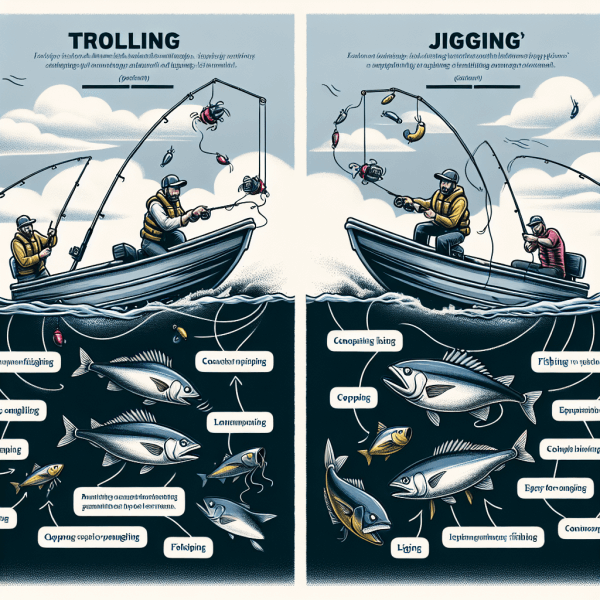The words 'trolling' and 'jigging' both refer to activities often associated with fishing, yet they represent markedly different methods and implications. This essay will explore the nuances of these terms, their etymology, usage, and provide examples to illustrate their distinct meanings.
Definitions and Etymology
Trolling is a technique where a baited line is drawn through the water, typically behind a moving boat. The term 'troll' can be traced back to the Old Norse word 'trolla', meaning 'to fish with a line.' It is used primarily in the context of fishing but has also been adopted into online lexicon to describe the act of provoking or upsetting others by posting inflammatory content on social media and forums.
Jigging, on the other hand, is a method that involves the use of a jig—essentially a weighted lure that is jerked up and down in the water to attract fish. The word 'jig' has roots in the late Middle English word 'jiggen', meaning 'to move up and down.' This technique requires a different set of skills, emphasizing the rhythm of motion and immediate reaction to strikes.
Methods and Techniques
When examining the techniques associated with these two terms, several differences become clear:
- Equipment: Trolling often requires specialized gear such as outriggers and downriggers, alongside multiple fishing lines to cover a wider area. Jigging usually involves simpler gear - a fishing rod and a jig. This makes jigging more accessible, especially for beginners.
- Movement: Trolling is a passive technique, relying on the motion of the boat to present the bait, whereas jigging is much more active, requiring the angler to constantly manipulate the jig to mimic the movement of prey.
- Target Species: Trolling is effective for larger predator fish like salmon and tuna that roam often in deeper waters. Jigging, conversely, is frequently employed for species such as cod and bass, which are found in shallower waters.

Examples of Usage
Understanding the contextual usage of both 'trolling' and 'jigging' aids in grasping their meanings:
Example of Trolling
“After searching for hours, we finally found the ideal spot and began trolling for trout, hoping to catch our limit before sunset.”
Example of Jigging
“The group of friends spent the afternoon jigging in the nearby lake, delighted by the number of bass they were able to catch with their colorful jigs.”
Broader Implications
While both words originate from the realm of fishing, it is noteworthy how 'trolling' has evolved into a broader cultural context. In online engagement, to 'troll' can denote intentionally stirring controversy, much like drawing attention while fishing with bait. The term carries a negative connotation in many instances, suggesting malicious intent.
On the other hand, 'jigging', while mostly confined to fishing terminology, implies an active, engaged approach to achieving a goal—be it catching fish or, metaphorically, 'jigging' one's way through tasks in an energetic manner.
Conclusion
In conclusion, while 'trolling' and 'jigging' may appear similar on the surface due to their fishing roots, they represent distinctly different methodologies, both in fishing and broader usage. Understanding these differences enhances our grasp of language and its adaptability, reflecting how terms can evolve and branch out in their meanings over time.








Have a discussion about this article with the community:
Report Comment
We're doing our best to make sure our content is useful, accurate and safe.
If by any chance you spot an inappropriate comment while navigating through our website please use this form to let us know, and we'll take care of it shortly.
Attachment
You need to be logged in to favorite.
Log In